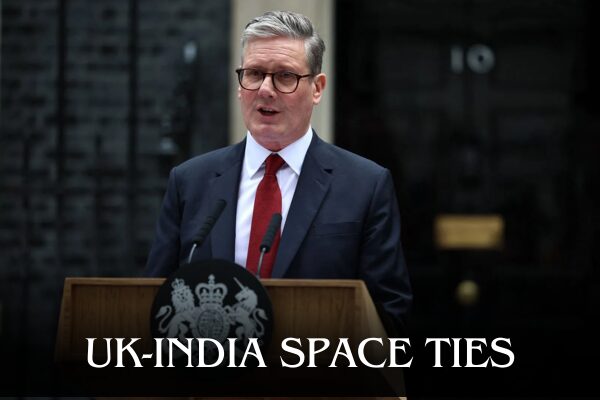As the British Prime Minister Keir Starmer prepares for his visit to India next week, the UK has signalled a major step forward in its strategic space partnership with India. Among a new tranche of 23 global space projects announced by the UK Space Agency, a key initiative will see British firm AccelerComm Ltd partner with Radisys India Ltd to develop cutting-edge technologies for the next generation of Non-Terrestrial Networks (NTNs).
Backed by nearly £500,000 in funding, the UK-India collaboration is one of the flagship initiatives under the UK Space Agency’s International Bilateral Fund (IBF), a £6.5 million investment drive designed to bolster the UK’s role in global space innovation through cross-border research and development.
The UK-India project will focus on integrating 5G base station technologies onto satellites, addressing the unique challenges of connectivity in orbit. By establishing a dedicated research and testing environment at Radisys’s facility in India, the collaboration aims to accelerate the commercial deployment of satellite-based 5G systems globally.
This announcement comes on the heels of the India-UK Vision 2035, a roadmap released in July this year, which explicitly calls for deeper cooperation between the two countries in the realm of space research, innovation, and commercialisation.
The Vision underlines a mutual commitment to leverage each country’s strengths, India’s fast-growing space ecosystem and the UK’s high-tech expertise, to co-develop solutions that serve both terrestrial and space-based challenges.
“These 23 projects demonstrate how the UK is leading the way in space innovation,” said UK Space Minister Liz Lloyd, speaking at the International Astronautical Congress in Sydney, where the funding was announced.
The UK Space Agency’s funding boost is part of a broader strategy to enhance its international footprint in space science and industry. The selected projects span a diverse range of technologies, from autonomous spacecraft navigation and lunar agriculture to 3D printing in microgravity and planetary imaging.
Dr. Paul Bate, Chief Executive of the UK Space Agency, highlighted the importance of international collaboration: “By combining UK innovation with global expertise, we are reinforcing our role as a world leader in space. Our partnership with India exemplifies this approach, bringing mutual benefit to both countries.”
The IBF has rapidly become a cornerstone of the UK’s space diplomacy efforts, supporting bilateral R&D efforts with key partners including the USA, Australia, France, Germany, Canada, Japan, and India. The programme not only funds technical projects but also aims to lay the groundwork for future trade, co-development, and shared missions.
The UK-India partnership in NTNs is particularly timely, as both nations are ramping up their investments in space infrastructure and next-generation connectivity. India’s recent success with the Chandrayaan-3 lunar mission and the launch of its Gaganyaan human spaceflight programme has further elevated its position as a key player in global space affairs.
As anticipation builds ahead of the British Prime Minister’s visit to India, this announcement sets the stage for deeper cooperation across science, technology, and innovation—sectors central to both nations’ global aspirations.


